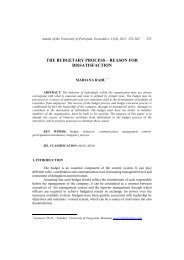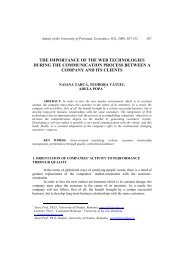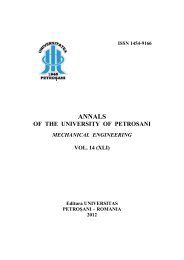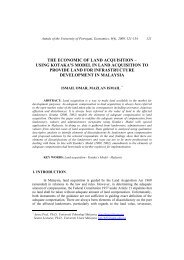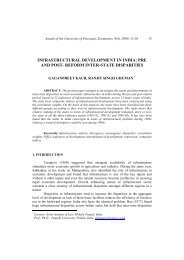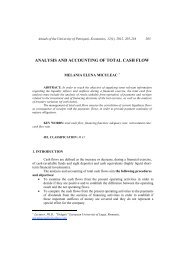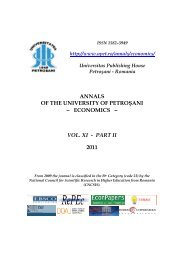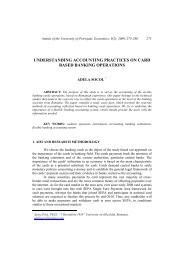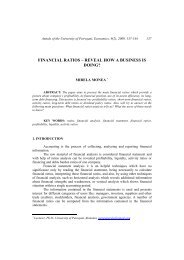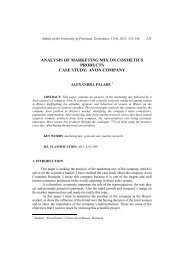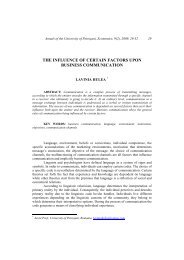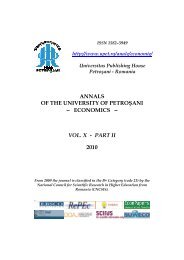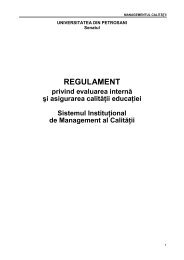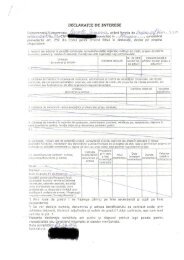annals of the university of petroÅani â¼ economics â¼ vol. xi - part i ...
annals of the university of petroÅani â¼ economics â¼ vol. xi - part i ...
annals of the university of petroÅani â¼ economics â¼ vol. xi - part i ...
Create successful ePaper yourself
Turn your PDF publications into a flip-book with our unique Google optimized e-Paper software.
74 Dima, I.C.; Vokorokosova, R.; Pachura , P.; Sandu, M.<br />
becomes a result <strong>of</strong> many social and economic processes such as: globalization and<br />
internationalization; high level <strong>of</strong> dynamics in technological progress; availability <strong>of</strong><br />
producing factors characterized by similar quality and price; development <strong>of</strong> market<br />
<strong>of</strong>fering management services (Nowicka-Skowron, 2002).<br />
In <strong>the</strong> second approach which is present mainly in <strong>the</strong> Western literature<br />
integrated management relates to a complex management <strong>of</strong> territorial development,<br />
which takes into account availability <strong>of</strong> natural resources (Decoster, 2000) (une gestion<br />
de developpement local integrée). Frequently, in French-language literature <strong>the</strong> very<br />
term integrated management relates to a development <strong>of</strong> agglomerations and urbanized<br />
areas (la gestion integrée de l’environement urbain) (Decoster, 2000). Multi-contextual<br />
character <strong>of</strong> development management is stressed and <strong>the</strong> following elements are taken<br />
into account: economic, social, technical, cultural, political, environmental.<br />
Development <strong>of</strong> integrated management is connected with globalization<br />
processes which lead to a loss <strong>of</strong> integrating role <strong>of</strong> territories. This fact is mirrored by<br />
disintegration <strong>of</strong> social and economic systems. W. Welfe (Welfe, 1996, pp.26-27)<br />
confirms a high rank held by integrated approaches to processes <strong>of</strong> development <strong>of</strong><br />
national economy. By building supply and demand models as well as by carrying out<br />
real evaluation <strong>of</strong> economic mechanisms Welfe concludes that and integrated approach<br />
towards investigated phenomena is <strong>of</strong> crucial importance. This comes from <strong>the</strong> fact<br />
that in national economy all elements <strong>of</strong> production process are characterized by<br />
feedback loop. Thus, and integrated approach towards management becomes<br />
indispensable in economy as a whole.<br />
Ano<strong>the</strong>r reason to consider <strong>the</strong> subject <strong>of</strong> integrated management constitute<br />
accomplishments <strong>of</strong> possibly most important event in recent years in development<br />
management i.e. United Nations Conference in Rio de Janeiro in 1992 – Agenda 21. Its<br />
achievements next to well known notions such as “sustainable development”, which<br />
shapes today’s approach to socio-economic development, constitute in fact an<br />
implementation <strong>of</strong> integrated approach. Agenda 21 states that “integration must be<br />
carried out with three areas bore in mind: ecological, social and economic”. It also<br />
promotes “reorganization <strong>of</strong> planning and management towards integrated<br />
management <strong>of</strong> natural resources and development” (Agenda 21, Chapt. 10).<br />
The review <strong>of</strong> chosen approaches presented above concerning concepts <strong>of</strong><br />
integrated management cannot present <strong>the</strong> totality <strong>of</strong> <strong>the</strong> issue. It may however<br />
constitute an argument for integrated approach to management <strong>of</strong> economic systems<br />
seen as a multi-contextual process in which <strong>the</strong> use <strong>of</strong> <strong>the</strong>oretical and practical<br />
knowledge gained through management <strong>the</strong>ory is fully justified.<br />
2. SYSTEM APPROACH - THE CONCEPT OF INTEGRATION<br />
Cartesius in his “Discourse on Method” states that one <strong>of</strong> stages towards<br />
discovering truth is to “divide each examined phenomenon into as many components<br />
as possible required for finding <strong>the</strong> best solution” (Cartesius, 2002, p.17). The<br />
consequence <strong>of</strong> <strong>the</strong> accepted method was derivation <strong>of</strong> <strong>the</strong> totality in relation to its<br />
components as well as linearity <strong>of</strong> phenomena and sequence <strong>of</strong> cognizance implying<br />
division <strong>of</strong> a problem into components and <strong>the</strong>n its “recomposition”.



